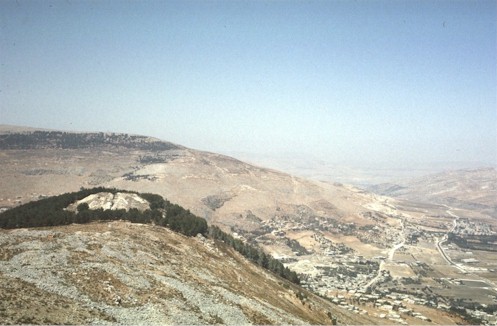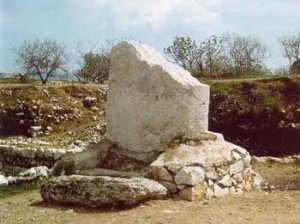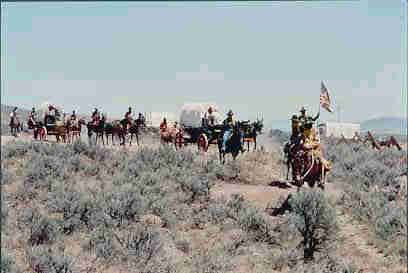
(Matthew 16:13-23)
May these words of this Peter be like a rock,
not a stumbling block!
|
|
"Who do you say
that I am?" Jesus asked. Simon Peter answered, "You
are the Messiah, the Son of the living God." And Jesus
answered, "Blessed are you, Simon son of Jonah! ... You are
Peter (petros), and on this rock (petra)
I will build my church..." Jesus then began to speak of
the rough road ahead. And Peter took him aside and rebuked him... "Get
behind me, Satan!" Jesus replied. "You are a stumbling
block..." (Matthew 16:13-23) May these words of this Peter be like a rock, |
"As for me and my house"
Message preached November 10, 2002
Long Green Valley Church of the Brethren
Glen Arm, Maryland USA
based upon Joshua
24:1-3a, 14-25
Right
there, in that holy place, some important commitments were made by the children
of Israel. Right there in Shechem, they chose to put away all other gods and
instead serve the Lord. It says that Joshua then took a big, old rock and  set
it up under an oak tree, making somewhat of an outdoor sanctuary to God (24:27).
Now, a funny thing about that stone - the one which marked that deciding spot
for generations to come - is what Joshua said about it. Listen.
set
it up under an oak tree, making somewhat of an outdoor sanctuary to God (24:27).
Now, a funny thing about that stone - the one which marked that deciding spot
for generations to come - is what Joshua said about it. Listen.
"This stone (he said) is a witness. Itís heard everything that God said to us. If you go back on your promise, itíll be a witness against you." (24:27)
I sort of wonder if there wasnít a smirk on this old manís face as he said this. After all, Joshua had seen quite a bit in his 110 years. You donít get to be that old without picking up a bit of wisdom along the way. By that point in time youíve seen the best and the worst in folks. He, himself, had been there through other decision points for Godís people - a few in which they just plain flunked out, when they picked the wrong option, even when he spoke out loud and clear for the right choice. They heard what God had said, but apparently it went in one ear and out the other. Youíd have thought they were rocks, themselves.
Now, I
have yet to find a stone with ears (working ears, that is). Rocks generally just
sit there. Unless they are moved by some other force. Stones have no volition.
As far as I know, they canít make decisions. And even if they could, they have
no power to act upon what they might choose. A stone is just a stone - unless,
of course, itís a memorial, a place to  remember.
remember.
People... well, people are a different story. We have the power of choice. Unlike rocks, we can move about quite freely. When weíre up and about, we face one decision after another. You ever stop and think about all the choices you face just driving down the road - coming to church this morning, for instance? Which route should I take? The light is starting to turn yellow - should I stop or continue? Should I turn on the radio? If so, what station? Some decisions seem minor, but others may mean the difference between life and death.
Itís easier to see the choices we face when weíre on the move, going somewhere - whether in an automobile or in some other vehicle, like school or work. Thatís right, school is a vehicle that helps get you from one place in life to another. Lord knows, you face so many choices along that journey. The truth is, however, that every day involves making choices - even very significant ones - even when you seem to be just sitting still.
"Choose this day," Joshua challenged the people of God. "Today, not yesterday, not tomorrow, but today, make a choice ... choose." This scripture story is very appropriate for where it sits in the Bible. When you think about it, that moment marked the end of one era, and the beginning of another. Up to that point, Godís people had been on the move. They were exiting Egypt, or wandering through the wilderness, or entering into and possessing the promised land.
Leading up
to that moment of decision, Joshua retold the story of the journey, how God had
faithfully led his people to  this
place and time, going all the way back to Abraham. Now was the moment of
their arrival. A shift was happening as these folks changed from pioneers
(if you will) to settlers. Pioneers face all sorts of decisions along the
way, some of them dangerous ones. Which mountain passage you choose, for
instance, could mean life or death. Once youíve arrived, however, youíre
able to relax and settle in. The difficult journey is over.
this
place and time, going all the way back to Abraham. Now was the moment of
their arrival. A shift was happening as these folks changed from pioneers
(if you will) to settlers. Pioneers face all sorts of decisions along the
way, some of them dangerous ones. Which mountain passage you choose, for
instance, could mean life or death. Once youíve arrived, however, youíre
able to relax and settle in. The difficult journey is over.
Funny thing is, arrival time is perhaps the most dangerous time of all. Why? Well, because when youíre "settled in" you think you donít have to make any more choices. Itís tiring to make decisions, isnít it?! Unfortunately, or fortunately (depending on how you look at it), every day involves choices, significant choices - even/especially once youíve settled in. The story of the Bible reveals that "settlement" times are perhaps the most dangerous of all. Whom did God send the prophets to un-settle, to irk and prod until they got off their fannies and repented? It was the "settled" people, folks who wandered from God in the daily routine of "life-as-usual."
Such wandering away from God is not terribly dramatic. It often happens little-by-little. You donít even think youíre moving, but you are. That is whatís so dangerous about it. You think youíre just sitting still. Youíre settled in, after all. However, as I said, every day involves choices. Settlers think they can become rocks. Itís good to be a rock, isnít it? Well, in some ways, yes. Lord knows we need solid people in this world, who are firm in who they are and what they stand for. We need persons who can be like touch stones to us, reminding us of what is most important in life. So, yes, it is good to be a rock. A rock can be a holy place, a sanctuary.
However, if by being a rock, we cease listening (as I said, I have yet to see a stone with functioning ears), and just sit in one location, and never make any decisions because thatís not something rocks do - well, is it good to be that kind of a rock? Not hardly.
What Joshua said at the end of his life was not just for his own generation or the generation which followed him. His words have been a clarion call down through the ages. After Godís people, hundreds of years later, had been uprooted from their comfortable settlements, their glorious nation torn apart by outside powers and inside strife, they heard Joshua speak once again. Though I wonder if that same stone and oak tree were still there in Shechem, the story itself functioned as a reminder. In it Godís people heard a painful witness against themselves. In it, though, they also heard the words of hope.
"Choose
this day," comes the challenge even now. "Today, not yesterday,
not tomorrow, but today, make a choice . ..
choose whom you will serve." Every day involves that choice. Yes, there are
significant moments when we make lifetime choices. If you have not chosen Jesus
Christ as your personal Savior, as the Lord whom you choose to serve, putting
aside all the other gods which desire your allegiance, then who or what do
you choose? At some point, you need to make a choice. Because not choosing is
itself a choice, a decision with eternal consequences. A stone doesnít need to
make any choices. You, however, are not a stone. You have ears. You have a will.
You have the power to choose.
..
choose whom you will serve." Every day involves that choice. Yes, there are
significant moments when we make lifetime choices. If you have not chosen Jesus
Christ as your personal Savior, as the Lord whom you choose to serve, putting
aside all the other gods which desire your allegiance, then who or what do
you choose? At some point, you need to make a choice. Because not choosing is
itself a choice, a decision with eternal consequences. A stone doesnít need to
make any choices. You, however, are not a stone. You have ears. You have a will.
You have the power to choose.
"Choose this day," is Joshuaís challenge to us. "Today, not yesterday, not tomorrow, but today, make a choice ... choose whom you will serve." Of course, these words are not just directed to those who have never made such a choice. We, who have already made some key decisions in life, need to hear Joshua speak. You see, we can live with the illusion that once we make a decision, weíre home free, and never need to make any more choices. Wrong! Once we choose to serve the Lord, our life is a daily choice. Every morning we need to decide whom we will serve. Every day we have to decide in favor of the Lord or some other fashionable god.
Thatís not easy to do. In fact, as Joshua said, "You cannot serve the Lord, for he is a holy God. He is a jealous God; he will not forgive your transgressions or your sins. If you forsake the Lord and serve other gods, then he will turn and do you harm, and consume you, after having done you good" (24:19-20). Ouch! Settlers beware. Every day involves a choice.
God "is a jealous God." Yes. From that statement, though, please donít picture God as an abusive husband motivated by jealousy to harm his bride. Thatís not what "jealous" means here. It would be better to hear the English word "zealous" (which shares the same Greek root), and think of Godís single-mindedness. That is, God will accomplish his purposes. There is a bigger picture out there. Call it Godís plan, Godís will, or the coming Kingdom of Heaven.
 Think of a train coming down the track. It keeps moving, whether or not someone
chooses at the last minute to jump onto the tracks. Is the conductor being
"jealous," in the way we normally think of that word, if the
train doesnít stop on a dime. No, the train is headed somewhere. A tragedy on
the tracks is the consequence of a wrong choice.
Think of a train coming down the track. It keeps moving, whether or not someone
chooses at the last minute to jump onto the tracks. Is the conductor being
"jealous," in the way we normally think of that word, if the
train doesnít stop on a dime. No, the train is headed somewhere. A tragedy on
the tracks is the consequence of a wrong choice.
Lest I paint a picture of an uncaring God, let me say that the Lord is passionate about people. "God loved the world so much," the Bible says (John 3:16). There is also such a thing as Godís wrath, his anger. Can there be real love, after all, in the absence of anger? My children can make me so angry sometimes precisely because I love them so much. Now, I know, I am not God (Thank God!!!). Anger can consume me if I let it. Only God can handle it. Does not scripture say, "Beloved (note that this verse begins with love), never avenge yourselves, but leave room for the wrath of God; for it is written, ĎVengeance is mine, I will repay, says the Lordí" (Romans 12:19, cf Hebrews 10:30, Deuteronomy 32:35). God is more than some apathetic train conductor.
There is a larger picture, though. When we pray, as Jesus taught, "thy Kingdom come, thy will be done," we place ourselves into that bigger picture. Godís realm is coming to pass regardless of the choices we make. When Joshua says that "God will not forgive your transgression," it means that God will not allow sin to obstruct his purposes. If a rock is standing in the way, God will move it. As the prophet Isaiah said, "Every valley shall be lifted up, and every mountain and hill be made low; the uneven ground shall become level, and the rough places a plain. Then the glory of the LORD shall be revealed..." (Isaiah 40:4-5).
There is such a thing a repentance, though, which simply means turning from sin and turning toward God. It, also, is a choice. When Joshua said that God "will not forgive your sins," he was simply referring to what we donít repent, that from which we donít turn. If youíre standing on the train tracks and you hear the whistle blow, do you remain where you are? "Choose this day," Joshua says. Today. Each and every day. "Choose this day whom you will serve."
 When I picture this scene from the end of Joshuaís life, I still see a wry
grin on his face when he says, "as for me and my family, we will serve
the Lord." Think about it. His last breath is not far away. Once heís
gone, that choice is out of his hands. His grandkids then bear responsibility
for the days to come. Will they choose to serve the Lord - not just that day,
but all their days? All Joshua could do was lead by example, trusting and
obeying - no other way.
When I picture this scene from the end of Joshuaís life, I still see a wry
grin on his face when he says, "as for me and my family, we will serve
the Lord." Think about it. His last breath is not far away. Once heís
gone, that choice is out of his hands. His grandkids then bear responsibility
for the days to come. Will they choose to serve the Lord - not just that day,
but all their days? All Joshua could do was lead by example, trusting and
obeying - no other way.
Letís turn to #544 in our hymnal and sing a song of faith in another Joshua. By the way, you do know that the name "Jesus" could also be read as "Joshua," donít you? If youíve never publicly chosen to follow Jesus as your Messiah, your Christ, I invite you to do so today. Feel free to come forward as you sing. Brothers and sisters, letís not sing the words through gritted teeth, as if (mumbling) "thereís no other way to be happy" than to "trust and obey." Instead, choose this day to serve the Lord with joy. Let it show in your voice, your face, your life. Today.
| online resources for this scripture text |
For commentaries consulted, see Joshua. |
|
"Has Joshua's Altar Been Found on Mt.Ebal?" (notes on an archeological dig) |
|
©2002 Peter L. Haynes